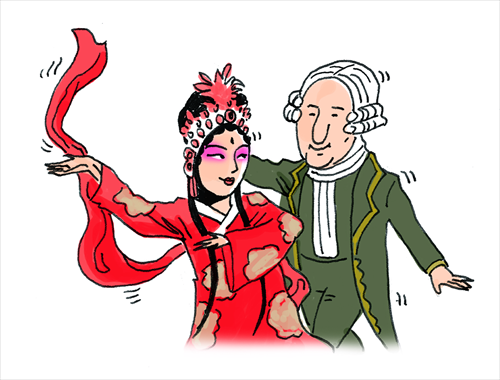HOME >> OP-ED
Paradisiacal visions mix two worlds into one
By Rong Xiaoqing Source:Global Times Published: 2015-5-28 22:18:01

Illustration: Liu Rui/GT
The Spoleto Festival USA started last week in Charleston, South Carolina. For 17 days, there will be 50 or so shows, including operas, ballet, puppetry and many other kinds of artistic entertainment presented to an audience of locals and those who travel to the historic town from near and far. The opening night featured the world premiere of Chinese artist Jennifer Wen Ma and composer Huang Ruo's joint venture Paradise Interrupted, which won a standing ovation from a full house of about 600.
Yet, many audience members who were completely mesmerized by the show, myself included, are not able to clearly define it. The artists call it an "installation opera." The main "installation" is a black garden made of inked cut-paper, thriving and withering as the papers are pulled out and folded back. The "opera" spans the techniques of Chinese traditional kunqu and those of Western opera.
But there is much more: a multimedia screen that is projected with varieties of flowing clouds, the shadows of the performers on the brick walls beside the stage, the orchestra consisted of Chinese and Western instruments. And the protagonist (played by kunqu singer Qian Yi) was inspired by Du Liniang in the 16th century Chinese opera The Peony Pavilion, but is not exactly the same character.
All of this gives the show multiple layers and an ambiguous nature. The audience, who may not fully understand all of the elements or be attracted to the theater by any one of them alone, can easily be captured by the beauty of the chemistry among them.
A work like this seems a natural fit for the Spoleto Festival. The festival originated with the Festival of The Two Worlds, founded by Italian composer Gian Carlo Menotti in Spoleto, Italy in 1958. It was a time when the rising power and prosperity of the US after WWII resonated across Europe. By giving his brainchild such a name, Menotti meant to have European and American cultures be featured alongside each other in the festival.
Menotti then brought it to the US under the banner of the Spoleto Festival USA in the historical town Charleston in 1977. Now the annual festival has become a major one in the US and one of the signature attractions of Charleston.
The sense of "two worlds" is still strong. Among this year's programs are Tennessee Williams' A Streetcar Named Desire presented by the Scottish Ballet, Shakespeare's Romeo and Juliet presented by Shakespeare's Globe theatre from London, and Sleeping Beauty presented in puppet form by Carlo Colla and Sons Marionette Company from Italy.
But clearly in today's concept, the "two worlds" are no longer divided by the Atlantic Ocean but the Pacific Ocean. And the Oriental influence has been more and more palpable in the festival over the years, from the participation of Yo-Yo Ma in his early years to the US premiere of Chinese opera director Chen Shizheng's Monkey: Journey to the West in 2008.
Paradise Interrupted brought the "two worlds" concept to another level. The audience members I talked to after the premiere didn't agree on whether the show is more Chinese or more Western. Huang Ruo, the composer, told me that during a previous preview, a Western couple in the audience had also argued about this.
It is not easy to have this effect. Many Chinese and Western artists have been talking about combining the elements from Chinese art and Western art and creating something new. But many such art works are merely collages that have a hybrid look but lack a soul. Yet to the artists who created Paradise Interrupted, the combination felt natural.
Given their backgrounds, this isn't a surprise. Ma came to the US in 1986 when she was 12, Huang in 1995 when he was 19, and Qian in 1998 when she was 23. Had they not come to the US, the three could possibly have still met and created something together. But it would be a very different work. At least, they might not have had the courage to borrow elements from a classical Chinese opera in this brave way if they hadn't spent so long in the US.
But now, being who they are and having two worlds merged into one in their hearts, they seem to see no boundaries. Neither does their work.
The author is a New York-based journalist. rong_xiaoqing@hotmail.com
Posted in: Columnists, Viewpoint